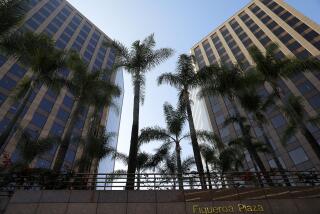3rd Dismissed Metro Rail Inspector Sues
- Share via
A third Metro Rail safety inspector has filed a lawsuit alleging cover-ups of dangerous conditions in the subway construction project.
In a suit brought Wednesday in Pasadena Superior Court, safety engineer Nelson McIntire says he was fired by the main subway contractor last September because of his “numerous warnings and complaints about the potential of serious hazards, including gas explosions . . . occurring at the Metro Rail construction site.”
McIntire also alleges that a supervisor for the Tutor-Saliba Corp. asked him to lobby his father--an inspector with Cal/OSHA--not to cite the contractor for “a serious safety violation.”
The suit says the younger McIntire “refused to compromise his position and duties,” and as a result was “blackballed” from future work on the mass transit project.
Two other safety engineers have filed suits since December against the Rail Construction Corp. or its contractors, alleging they were fired for strictly enforcing safety regulations.
A spokeswoman for the RCC--the construction arm of the Los Angeles County Transportation Commission--said agency officials had not seen the latest suit and could not comment.
But the president of Tutor-Saliba--part of a joint venture doing most of the subway tunneling work--complained that fired workers were retaliating against his Sylmar-based company by leveling outlandish accusations.
“It’s reached such a point that everybody who gets terminated . . . can raise enough hell . . . to blackmail us,” builder Ron Tutor said.
Tutor said he had not seen McIntire’s lawsuit, but called “absurd” the suggestion that the company would “fire a safety engineer for pointing out safety violations.”
In fact, there are “dozens of people watching other people” on the project and “it’s impossible to do the things they say,” Tutor said.
In December, safety engineer Gloria Fuqua alleged she was fired by Tutor-Saliba one hour after ordering work halted at a subway station beneath 7th and Flower streets because of unsafe levels of toxic fumes.
In March, safety engineer Jim Hamilton sued the RCC and four contractors, charging that he was fired because of his “numerous warnings and complaints” about conditions on the Red Line project, the scene of a serious 1990 fire.
Hamilton said efforts to improve safety were undermined by pressure to speed up construction.
McIntire’s suit was brought by Pasadena lawyer Larry M. Roberts, who also represents Hamilton. Named as defendants are the RCC, Tutor-Saliba and the Tutor-Saliba Perini joint venture.
McIntire said he was hired in 1989 as a gas tester. It was last July, the suit alleges, that a supervisor asked him to contact his father, an inspector with Cal/OSHA, the state job safety agency, “to use whatever influence he had to convince (his father) to refrain from citing Tutor-Saliba” for unsafe use of cranes.
Nelson McIntire refused to intervene with his father, according to the suit, and the contractor was later cited for six violations.
The same month, the suit alleges, RCC inspections found electrical hazards at the Union Station job site and McIntire “recommended that the system be reworked.” But his supervisor told him “not to go overboard on safety” and the contractor “failed to take action on the existing hazards,” the suit says.
In August, an electrical fire broke out at the station, not injuring anyone but requiring work to stop, McIntire said.
On Sept. 13, the suit says, McIntire was fired “without cause and without warning.” He was unable to find another Metro Rail job and was out of work until this week, when he was hired as a safety inspector in New Mexico, he said.
In addition to raising safety issues, McIntire’s suit complains that he was forced to work overtime without extra pay. The suit requests $11,977 in overtime pay and other damages.
While RCC officials would not comment on the suit, they have defended their safety standards in the past as more stringent than those required by Cal/OSHA.
An independent safety audit made public last week gave the rail project a mixed report card. It said workers building the first leg of the Metro Red Line suffered accidents twice as often as the national average for heavy construction, but the rest of the project had fewer than average accidents.
More to Read
Sign up for Essential California
The most important California stories and recommendations in your inbox every morning.
You may occasionally receive promotional content from the Los Angeles Times.










